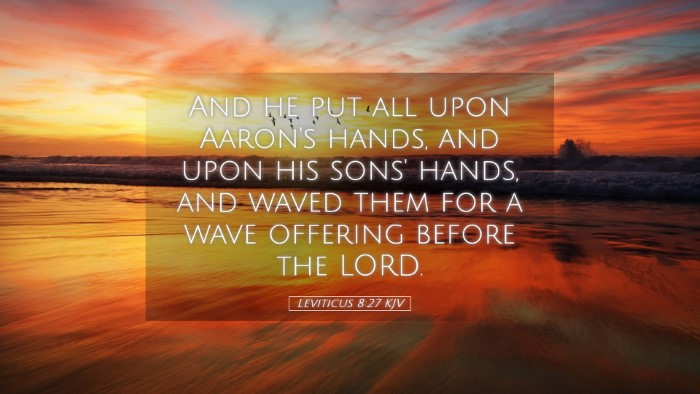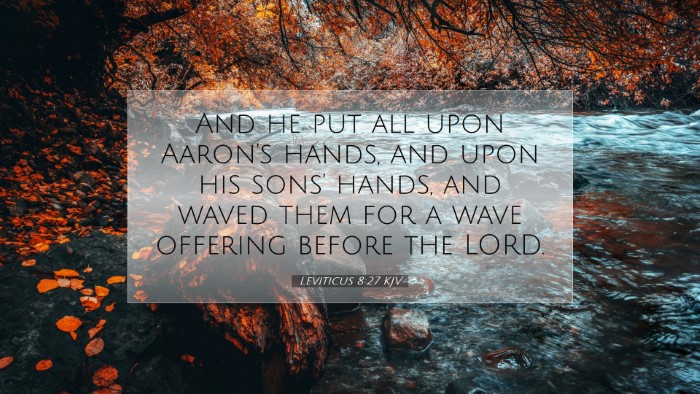Commentary on Leviticus 8:27
Verse Context: Leviticus 8:27 reads, "And he put all the fat upon the breasts, and he burnt the fat upon the altar." This verse is situated within the instructions regarding the consecration of Aaron and his sons as priests, a pivotal moment in Israelite worship and sacrificial practices.
Significance of the Action
The act of placing the fat upon the breasts can be interpreted as a symbol of the offering being presented wholly to God. The fat is often seen as the best portion, representative of the bounty and richness of the sacrifice.
- Fat as Symbolism: According to Matthew Henry, the fat of the sacrifice represents the increase of strength and vigor, akin to how the best portions are reserved for God, signifying our total dedication and devotion.
- Role of the Priesthood: Albert Barnes highlights that this act underscores the role of the priest as an intermediary between God and the people. The fat and the offerings were not merely rituals but had theological implications indicating God's acceptance of the offerings offered by the high priest.
- Consecration Process: Adam Clarke points out that the burning of the fat represents the process of sanctification. Just as the fat is burnt as a pleasing aroma to the Lord, it signifies the purification and readiness of the priests to serve in the holy place.
Theological Implications
This passage speaks volumes about the nature of God and His relationship with Israel. The process outlined in this verse serves multiple purposes:
- Divine Acceptance: The act of burning the fat symbolizes that God accepts the offering of His people. Clarke notes that this indicates that the offerings presented are not just a mechanical compliance with the law, but are acts of worship that stem from a sincere heart.
- Consecration of Leadership: Henry asserts that the consecration of priests is imperative for spiritual leadership within Israel. Only those who are dedicated and set apart can approach God on behalf of the community.
- Foreshadowing Christ's Work: The burning fat may also foreshadow the ultimate sacrifice of Christ. Just as the fat was considered special in the sacrificial system, so too was Christ as the Lamb of God, whose sacrifice is sufficient for all.
Practical Applications for Today
This examination of Leviticus 8:27 invites modern readers, particularly pastors and theologians, to reflect on their own capacity for worship and sacrifice:
- Worship and Offerings: Just as the Israelites were called to present their best offerings to God, believers today should evaluate whether they are offering their best in service and worship. This encourages a personal examination of what one values and offers to God.
- Leadership and Responsibility: Understanding the weight of consecration and leadership can prompt church leaders to seek a deeper personal holiness, recognizing that their ability to lead is tied to their dedication to God.
- Greater Sacrifice: The idea that Christ fulfilled the sacrificial system in its entirety should inspire believers to live lives that reflect gratitude for that sacrifice, encouraging a lifestyle of holiness and worship.
Concluding Thoughts
Leviticus 8:27 is more than a historical account of a ceremonial act; it is a profound reminder of the nature of true worship and the seriousness of approaching God as His chosen people. The insights drawn from the commentaries of Matthew Henry, Albert Barnes, and Adam Clarke provide a comprehensive understanding that encourages both reverence for God and an earnest desire to live in accordance with His will.


